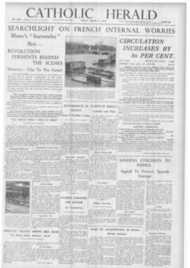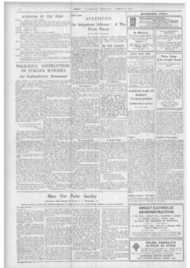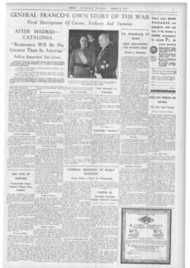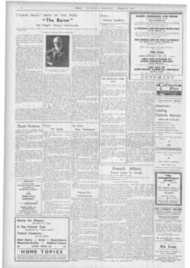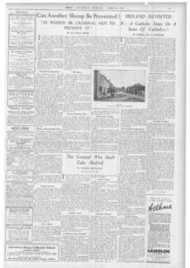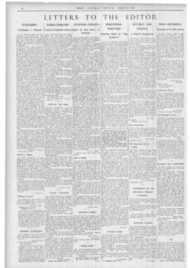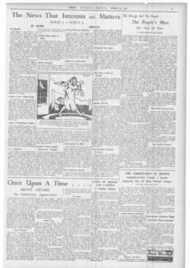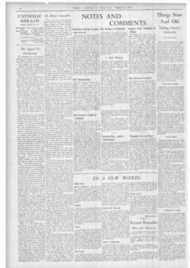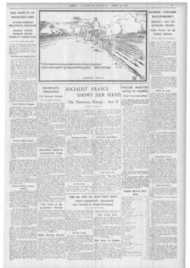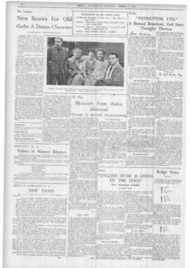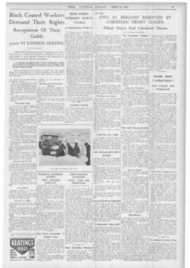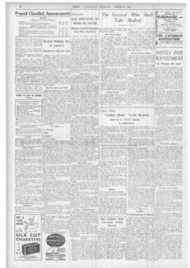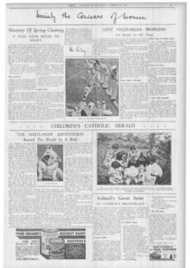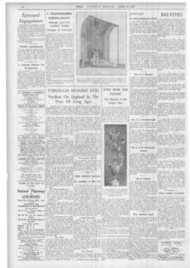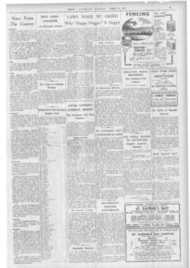Page 4, 12th March 1937
Page 4

Report an error
Noticed an error on this page?If you've noticed an error in this article please click here to report it.
Tags
Share
Related articles
An Orthodox Teacher Of Scholarship And Sanctity
Ancient And Modernist
Baron Von Hugel
F Ontana Rooks Publish An Anthology Of The "writings Of...
Writing The Life Of Von Hugel
iC Catholic Herald " BOOK OF THE WEEK
"The Baron"
Von Hugel's Unique Contribution
Baron Friedrich Von Hiigel: A Study of his Life and Thought by Maurice Nedoncelle. Translated by Marjorie Vernon (Longmans, 8s. 6d.) Reviewed by MICHAEL DE LA BEDOYERE.
L'Abbe Nedoncelle has undertaken an immense, I should say, an impossible task in trying to gather together, order and expound the teaching of the Baron von Hugel within the compass of some two hundred pages.
When the book first appeared in French it seemed to me a poor substitute even for Alger Thorold's Readings from Friedrich von Hiigel, as the general reader's first introduction to the work of the great religious philosopher. In its English translation it reads better-a tribute to the magnificent translation of Marjorie Vernon, but perhaps more fully explained by the fact von Hilgel's language was so closely linked with his thought that, what with the quotations from the original and the constant use of phrases that in their English dress seem' to echo von Hfigel's own words, we get closer to him in the translation than in the original French.
I have always been surprised at the constantly reiterated view that the Baron was difficult to read or even that his style was ugly and cumbersome or that he had never fully mastered the English language. On the contrary I should hold that no philosopher has succeeded better in making language the servant of his thought and feelings. It is because his language never gets in the way of his own working mind, never sets up an interesting secondary form of its own that one obtains from his writings an effect of sincerity, of real, hard thinking, of a whole man at work, unique perhaps in literature. The result may not, from the point of view of pure literary form-if there is such a thing-be delicate and pretty, nicely balanced and smart, but it precisely conveys the beauty that lies in the strength, virility and reality of the Baron's mind and character.
To attempt to abstract the Baron's ideas and conclusions from that lifetime's quarrying for them revealed for us in his own writings is to condemn oneself to lose the one unique thing the Baron had to contribute to the world : a mind at work on the plane of the supernatural and the plane of the natural at once so clear and so honest that every step forward painfully and arduously taken meant as far as he and his readers were concerned a secure and perteanent advance on both planes, the supernatural one always providing the light which made advance on the natural one possible, and both together slowly but inevitably moving towards the Light of the Divine Revelation which shines above but does not in its full intensity penetrate into those regions in which our human minds are struggling with the objects they find presented to them in this world. It was because von Hugel had the power to concentrate on the darker layers, as it were for their own sake, the darker layers into which the least of the light of Revelation and the light of the supernatural within the soul penetrates, and yet the humility never to refuse the help of all the Light supernatural and natural that offered, the sense, so to say, to use the light but never to let it blind him to what lay in the dim corners-it was because of this that he made so great and so good an impression on his generation.
To set forth therefore the goal he attained rather than to follow the way along which he attained it is to do no more than describe the teaching of the Church and the full relations between the supernatural and the natural, matters written of in many other places in a simpler and happier way, and not to reveal the unique story of a supremely open mind, open to every influence natural and supernatural, moving towards, seeing further into, penetrating further afield within the ambit of, that Truth.
Just because every little step, every little struggle, counted with von Hugel. just because for him there was no way round the object of his enquiry, no part of it that had not its significance, just because darkness was to him as important as light, there can be no short cut to understanding him. To know von Hugel, you must read him.
It may seem churlish to greet this translation in this way, for the author who plainly has the greatest admiration for the Baron has accomplished a labour of love. and it may well be that those to whom von Hugel is but a name will be led by the Abbe to the source. For those who already know him the present work is of value for two things: the preliminary sketch of his life through and out of the modernist crisis with emphasis laid on the fact that the Baron's whole outlook is essentially opposed to the idealism and subjectivism of modernism. his sympathy for certain aspects of it being due to the apparent intellectual honesty of certain modernists in facing certain real problems; and the footnotes in which deviations on the Baron's part from the traditional teaching of the Church are indicated.
Certain changes from the original edition have here been made, and they might be debated.
The great work on the Baron is yet to come, and it must be a long biographical study which will follow the workings of his mind, his reading, his contacts, his friendships as he hacked out a path for himself through the theological, philosophical, scientific forests of hisatime, a path that twisted and turned but gradually grew straighter and firmer until it led at last to the source of that Light by which he had always sincerely, at times almost desperately, guided himself.
blog comments powered by Disqus


